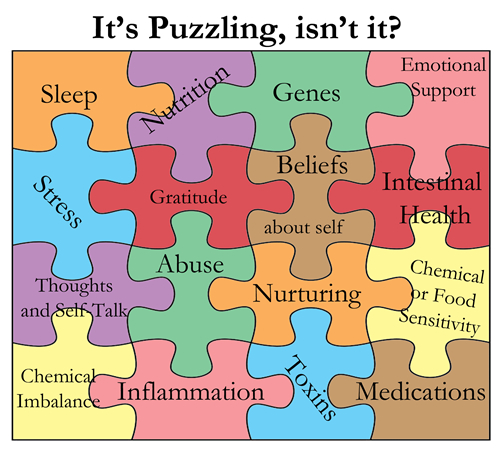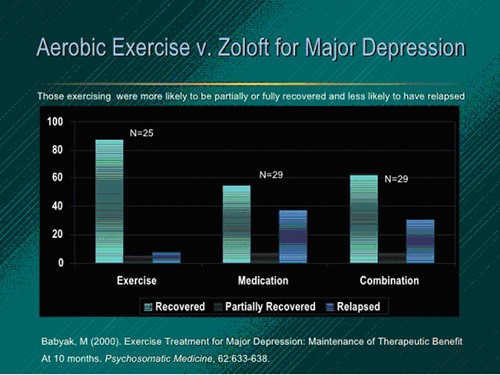Depression...Is Prozac the Answer?


Your Happy Place
I bet you think I am going to go tell you to take pills. Or…we need to increase your serotonin.
Depression is not caused by a lack of serotonin.
- A 2010 study analyzed other studies done on anti-depressant medications. It found that for mild to moderate depression, placebo worked as well as the drugs.
- Each time I dispense an antidepressant, I am required to give them a page warning them of the risk of suicide in children and adolescents.
- In post-menopausal women, antidepressant use correlates with a 32% increased risk of death.
Many factors affect the development of depression. Sleep, stress, nutrition, Genes, Self Beliefs, history of abuse, nurturing, inflammation. It is like a big puzzle.*

Because it involves so many factors, it is important to start with the basics of good nutrition. Here are some nutrients that have been shown to help in depression.*
Fish oil has been shown in studies to help depression and decrease inflammation. The omega 3 oil in fish, along with omega 6 oil, is important in helping the body make serotonin. The best way to get fish oil is through eating fish twice per week. Some fish are at lower risk for mercury contamination. These are haddock, sole, salmon, tilapia and trout. Tuna and halibut are not quite as safe, but safer than sea bass or grouper. If you want to use a fish oil supplement instead, it is important to get a good quality fish oil that is guaranteed to have no mercury. To minimize burping up fish taste with a fish oil supplement, try an enteric coated fish oil or a lemon flavored fish oil. The purest quality omega-3's are also an amazing option.*
Other dietary factors that relate to good mental health are zinc, selenium, and folate. A number of studies demonstrate that zinc levels are lower among patients with depression and 25 mg zinc supplementation may improve depressive symptoms. Lower levels of selenium have been associated with depression in studies. Studies have documented low levels of folate among patients with depression. Some small trials showed a beneficial effect of folate in depression, at a dose of 500mcg. Folate, zinc, and selenium are found in a healthy balanced diet of meat, nuts, legumes, vegetables, fruits, limited grains, and oils. Oftentimes, the amount of these nutrients can be found in a good multivitamin. Read my blog about what makes a multivitamin good for more information. Here is a link to my favorite multivitamin.*
Between 30 and 40% of the US population has a genetic mutation of the MTHFR gene (methylenetetrahydrofolate reductase gene). " The MTHFR gene is responsible for making a functional MTHFR enzyme. If the MTHFR gene is slightly altered (mutated), the MTHFR enzyme’s shape becomes distorted. Enzyme function depends a lot on shape. It is similar to the grooves on a key. If the grooves on a key are slightly different than the lock, the key may fit and turn the lock a little but it does not unlock the door." (from MTHFR.net) This enzyme is one of the steps in conversion from folic acid to methylfolate (the active folate in our body). When the enzyme doesn't work properly, then we don't have enough methylfolate, which can be a factor in fibromyalgia, cancer, autism, and DEPRESSION. I believe it is so important to have the right type of B vitamins in your multivitamin to combat this. My favorite Multivitamin contains methylfolate (the active folate in your body)*
Exercise naturally boosts serotonin and dopamine levels. I call it my "emotional hygeine." Exercising outside does a better job of boosting mood that exercising inside. The following is a study of exercise vs. Zoloft (sertraline) on major depression:

You can see from this study that more study subjects recovered with exercise than sertraline, and there were only a small portion of relapses in the exercise group compared to the sertraline group. Exercise is one of the most powerful tools in any individuals belt to help depression.*
Hormones: Hormones also regulate mood. Estrogen and progesterone levels change throughout the month. The changes in these levels are responsible for the mood changes seen with PMS. When estrogen and progesterone levels decrease after menopause, the incidence of depression decreases. High testosterone can cause anger and aggression. Hormone health is very closely related to the foods you eat. A diet high in refined grains and sugar along with saturated fat (butter, cheese, frying oil) actually cause an imbalance of estrogen and progesterone. This worsens PMS, menopausal symptoms, and depression (and it isn't so hot on the waistline).*
Vitamin D
- Is actually a hormone, not a vitamin
- Needed for calcium absorption; modulates bone growth, immune function, and mood; and prevents colon cancer. Vitamin D has been proven to help in SAD (seasonal affective disorder), which is depression occurring in the winter months.
- At this latitude, we do not get enough Vitamin D in the winter.
- Supplement with Vitamin D3 5000 IU 3 times or more per week.*
Sleep: Your body requires to 7.5 to 8.5 hours of sleep per night to fully recover and repair damage. It is important to try to go to sleep at the same time every night. Symptoms of sleep deprivation include:*
- Irritability and nervousness
- Problems with concentration and memory
- Increases depression bipolar disorder, ADD and ADHD)
- Frequent illness and slowed healing
- Blurred vision
- Weight gain
- Performance drops after 17 hours of being awake by the equivalent of a blood alcohol level of 0.05%
Consider one thing you could do to help improve your mood and work on that one thing! Don't get overwhelmed, just work on one thing at a time. *
You can do it...You have the power to heal!!!